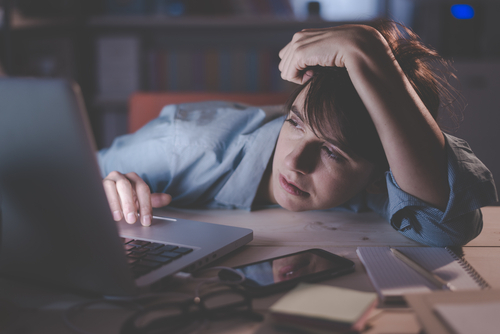There are several needs common to all human beings, including water, food, shelter and warmth. These items form the basis of Maslow's Hierarchy of Needs: the physical and psychological requirements that must be met before humans can complete other functions. Another of the basic needs is sleep. Did you know the average adult is supposed to get seven to eight hours of sleep every night?
With sleep being a basic requirement of human life, it's disturbing to find research that suggests 50 to 70 million Americans chronically suffer from sleep disorders. That same research shows there are more than 90 sleep disorders that can affect a person.
Sleep deprivation is a real issue, and there are a number of consequences for not getting a good night's sleep. Here are a few of them - and steps you can take to try and overcome those sleepless struggles.
Sleep Deprivation Means You're Less Productive During Waking Hours
A lack of sleep has an immediate impact on your ability to focus in the days following. In an article for The Atlantic, one journalist recounts having spent four sleep deprived days rambling, hallucinating, and unfocused. You're not doing your professional life any favors by staying up late. A lack of sleep impacts employees' creativity, moral judgment, and memory. In fact, the Centers for Disease Control and Prevention estimates sleep deprivation impacts American businesses to the tune of $63 billion each year through a loss of employee productivity.
So while you think an all-nighter may be best to finish that important report, you'd be better off shutting down for the night and reexamining the work in the morning.
Tips for Getting More Sleep Each Night
- Stop using the computer at least one hour before bedtime. The blue light emitted by device screens can cause eye fatigue and leads to your body producing less melatonin, a hormone that helps aid in sleep.
- If you must use your computer until bedtime, download an app such as Twilight or f.lux that can filter harmful blue light from your screen and dims the backlight in preparation for bedtime.
- Avoid caffeinated drinks in the afternoon and evening.
- The National Sleep Foundation recommends going to bed and waking up at the same time each day.
- Don't eat large meals before bedtime as they will give your body a boost of energy that will make you want to stay awake.
- Avoid excessive use of alcohol; as your body processes alcohol, you spend less time in restorative rapid eye movement (REM) sleep; the more you drink before bed, the more pronounced the disruption.
Sleep Deprivation Puts Your Life and the Lives of Others in Danger While Driving
Luckily most drivers wake up before any damage is done, but there is also evidence to show this isn't always the case. The National Highway Traffic Safety Administration estimates driver fatigue caused an average of 83,000 crashes every year between 2005 and 2009, leading to more than 800 fatalities in each of those years.
Tips to Avoid Drowsy Driving
- Get more sleep: aim for seven to eight hours every night, if possible.
- Avoid drinking alcohol before driving; even if you're not legally impaired, a single drink can impact your ability to be fully aware and awake behind the wheel.
- Use public transportation, taxis, or call a friend if you're feeling tired or have taken medication that has drowsiness as a side effect.
- Pull onto the shoulder or into a parking lot if you feel sleepiness coming on - taking proactive precautionary measures are always better than falling asleep while driving.
Sleep Deprivation Affects Your Long Term Health
Part of this could be caused by sleep's suspected link to a human's hormone levels. Psychiatrist Dr. Joyce Walseben has conducted research that shows mood and sleep are inherently linked, and that a lack of one has the potential to severely impact the other. In The Atlantic article mentioned earlier, Dr. Walseben states that when "neurotransmitters are disrupted by sleep loss, the chemical changes in the brain can result in manic feelings and behavior similar to bipolar disorder." Chronic sleep deprivation has the ability to compound these hormonal imbalances to have long term impacts on health and mood.
Researchers at Harvard Medical School wanted to chart the connection between sleep deprivation and hypertension. They took more than 700 healthy men and monitored the amount of time they spent in a state of deep sleep. After three years, it was determined that those who spent less than the recommended 25% of their nightly rest in a deep sleep state were more likely to develop high blood pressure.
As for the links between sleep deprivation and obesity, one study conducted over a 13-year period found that adults who slept six hours or less each night were 7.5 times more likely to have a higher body mass index than those who got a good night's sleep.
Tips to Getting More Sleep Over Time
- Don't think that a weekend of sleeping in can make up for chronic under-sleeping throughout the week. Sleep hours lost cannot be easily regained, so it is best to simply get seven to eight hours each night.
- Research has shown that the more physically and cognitively engaged you are during the day, the more likely you are to experience a longer period of deep sleep, the state that fully recharges your body and mind.
Ultimately, the way your body is feeling will be the best indication of whether or not you need more sleep. Know what makes you feel focused and fresh, and aim for the golden number of at least seven hours of sleep each night. Your long term and short term health will benefit from it.
